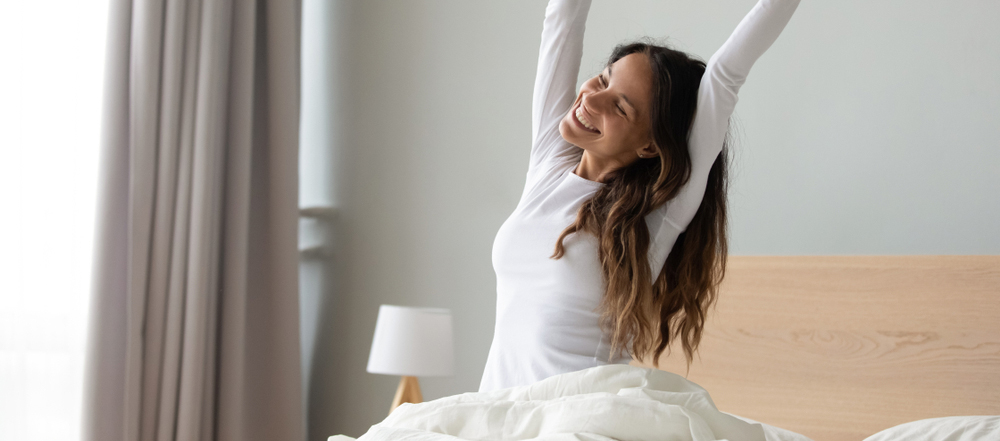As the dark winter nights draw on and people in the UK grapple with changing their holiday eating habits, a sleep expert has revealed four top ways to tackle the January blues.
Health-focused sleep experts Zoma Sleep have provided some expert tips on how to enjoy a good night’s rest this January to help improve your mood, energy levels and more.
Your holiday eating habits are damaging your night’s sleep
With the cold weather raging on and our cupboards stuffed with leftover food from the holidays, you can very easily find yourself indulging in snacks all winter. Late-night snacking can prove very detrimental to your sleeping schedule. If you consume a lot of food just before bed, your body will be stopped from unwinding to sleep mode in order to digest all you have eaten. This disruption affects your body clock, meaning it will take longer for you to drift off to sleep, damaging your schedule and possibly affecting your mood and health.

Foods which are high in protein, like chicken or meat, can prove particularly disruptive to your sleeping schedule. Our bodies take longer to break down these types of food, much like those high in fat. Items which contain high levels of tyramine can also damage your night’s rest. Consuming cured meats like pepperoni and salami or aged cheeses may trigger the release of norepinephrine which stimulates your brain and keeps your body more alert.
Oversleeping can WRECK your entire day
While it’s incredibly important to get enough rest for your health and wellbeing, it is equally important to ensure you aren’t oversleeping. With less daylight hours and longer, dark nights in January, people find it increasingly difficult to leave their bed in the morning. Experts say adults need up to nine hours sleep a night, but if you find yourself oversleeping, this may have a negative impact on your mood, productivity, and overall health.
Instead of spending those extra hours in bed at the weekend or taking daytime naps, it is recommended to maintain a daily routine which enables you to relax and unwind each night. Whether you prefer taking a warm bath, reading a book or meditating, these practices can help you develop a nighttime ritual which means you can keep your schedule on track.
Unlock better sleep with a 15-minute daytime stroll
Naturally, our body’s internal clock associates things like darkness with nighttime, which can be a struggle during the winter months when daylight hours are massively reduced. Often people find themselves waking up to a dark morning and working until it is dark again in the evening. Seasonal affective disorder, or “winter depression”, is more common and severe during the winter months, with less daylight exposure resulting in low moods, depression and more.

While it may seem gloomy and cold outside, a 15-30-minute walk every day can do wonders for your mood and overall sleep schedule. Where possible, experts even recommend going for a walk in the morning daylight or simply spending time outside. In the brighter months, we are acclimated to waking up to daylight, so if you are able to spend some time enjoying the morning daylight during winter, this will let your body know it’s daytime. If going outside isn’t feasible during the cold months, even spending some time by a window in your home where you are exposed to lots of natural light will help your body thrive.
As well as helping regulate your body’s circadian rhythms for a good night’s rest, exercise is particularly key in relieving any stress of the holidays, resolutions, financial strain, loneliness, and more that are particularly common at the beginning of a new year. The endorphins released from exercise will help alleviate some of the burden, lifting your mood and reducing anxiety levels, allowing you to properly unwind before bed. The NHS recommends 150 minutes of moderate-intensity activity or 75 minutes of vigorous-intensity activity every week.
Make your bedroom a phone-free zone for a better night’s rest
Electronic devices like mobile phones, tablets and more are so embedded in our everyday lives that controlling the time we spend on screens can prove incredibly challenging. While many may choose to unwind by doomscrolling on social media, this common practice often sees one video become 10, 20 or even 30. Screens emit a blue light which disrupts your natural sleep schedule by convincing your body that it is in fact daytime. This often halts the release of sleep hormone melatonin, which helps us regulate and prepare our bodies for sleep each night. By making our bedrooms a screen-free zone, you will help foster a better environment to relax and unwind.
Dr, Jordan Burns DC, MS, a sleep wellness expert and spokesperson for Zoma Sleep commented: “Sleeping in the winter can be more challenging because of several factors. First, the lack of sunlight during shorter days can disrupt the body’s internal clock and affect the production of sleep-regulating hormones. Second, temperature fluctuations and dry air from indoor heating systems can make it harder to maintain a comfortable sleeping environment. Additionally, some individuals may experience seasonal affective disorder (SAD) during the winter, leading to changes in sleep patterns.
“It’s important to maintain a consistent sleep schedule, ensure a comfortable sleeping environment, and manage stress through relaxation techniques and exercise.”





